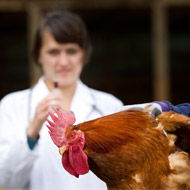
Method may cut number of vaccines required
A new method of genetically modifying the Marek’s disease vaccine so that it can protect against other viruses has been developed by The Pirbright Institute.
The new vaccine is able to protect against infectious bursal disease (IBD) and may eventually protect against Newcastle disease and avian influenza. It is hoped that the new approach could lead to a decrease in the number of vaccines that need to be given to each bird.
Using the gene editing system CRISPR/cas9, researchers added an IBD virus gene into a Marek’s disease vaccine virus. The additional gene protects birds from IBD, as well as the protection already provided by the Marek’s disease vaccine. This means that bird keepers would only need to administer one, not two, vaccines to their flock.
While there are vaccines in circulation that achieve a similar result, the CRISPR/cas9 system is faster and more accurate than previous methods. Pirbright scientists believe this will markedly cut the time required to produce new vaccines and help to protect birds quickly against new strains.
“The method we have created with CRISPR/cas9 really increases the scope of how we edit the Marek’s disease vaccine to include other virus components,” explained professor Venugopal Nair, joint leader of the research at Pirbright.
“Now we have shown that our edited vaccine protects against both Marek’s disease and IBD, we are looking at inserting more genes from other viruses.”
The researchers aim to develop a vaccine that will be able to protect against multiple avian viruses and will soon focus their efforts on Newcastle disease and avian influenza. Because the method is so flexible, it means that the vaccine virus can be edited to include new genes as the viruses evolve.
The study was funded by the Biotechnology and Biological Sciences Research Council and can be found in the journal, Vaccine.



 The veterinary mental health charity Vetlife is inviting the veterinary community to join it for a sponsored cold-water dip.
The veterinary mental health charity Vetlife is inviting the veterinary community to join it for a sponsored cold-water dip.